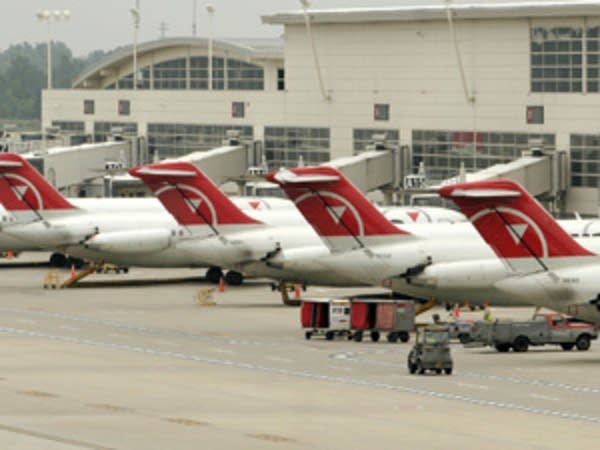Past airline mergers marked by problems
Go Deeper.
Create an account or log in to save stories.
Like this?
Thanks for liking this story! We have added it to a list of your favorite stories.

About 20 years ago, Northwest combined with its main rival at the Twin Cities airport -- Republic Airlines. Eagan-based Northwest bought Republic for about $900 million in what was at the time the biggest deal in U.S. aviation history.
Northwest was known for its international service. And Republic had a solid domestic route system. Northwest felt it could expand its international business by capturing Republic customers. Executives at the airlines thought the two carriers were a good fit.
Eventually, they were. But even 20 years later, some passengers at the airport still remember how difficult the merger was.
"It was not a pleasant experience for travelers," recalls Joe Kapolka of Shorewood.
Turn Up Your Support
MPR News helps you turn down the noise and build shared understanding. Turn up your support for this public resource and keep trusted journalism accessible to all.
He recalls bitter employees, flight delays, cancelled flights and lost bags.
I think it was very hard on everybody. On the employees. On the traveling public.
"As the merger was going on and taking place, the level of service started to deteriorate," Kapolka says.
Labor unrest led to chronic flight delays and baggage problems. In the first month of the merger, October 1986, about 40 percent of Northwest flights were late, according to news reports at the time.
It took more than a year for Northwest to resolve some service problems.
Roger Anderson says luggage disappeared all too often.
"I remember the uproar of the mechanics and baggage handlers and lost luggage," Anderson says. "I used to fly to Milwaukee back and forth. And luggage would get lost,"
That's what Dan Colvin of Apple Valley remembers.
"It was quite a mess, as I recall, because there was not much assimilation from one system to another. But other than that I don't really remember much," he says.
Except for one thing.
"Saying good-bye to Herman the Goose".
The goose was the symbol of Republic Airlines.
Lost bags and other snafus seem inevitable when airlines merge. The latest big airline marriage -- involving America West and US Airways -- has been plagued by services woes and ongoing labor discontent. That merger can't provide much reassurance to customers of other airlines that could combine.
For the first half of 2007, nearly 40 percent of US Airways flights were late. But the airline has been improving in recent months.
Twenty years ago, one of the headaches in the Northwest-Republic merger was combining the two workforces.
Employees fought bitterly about seniority rights. That's because pay, benefits and job security were tied to seniority. It took years to resolve seniority issues.
Bill Wren, an executive now with the Metropolitan Airports Commission, was Northwest's chief spokesman at the time of the merger. Wren says union squabbling was at the root of many problems Northwest encountered.
"They were all obviously trying to protect their individual turf. Understandable. But it was a difficult thing," Wren says. "Even though they belonged to the same unions, they didn't necessarily beat to the same drum."
In the summer of 1987 Northwest sued its own workers, accusing union machinists and baggage handlers of vandalism, and an illegal work slowdown. Union officials denied the charge and said the company was looking for a scapegoat.
Veteran union leaders such as flight attendant Mollie Reiley say everyone suffered as Northwest and Republic became one airline.
"I think it was very hard on everybody. On the employees. On the traveling public. There were situations in Detroit. Flight attendants fighting with each other. It was a mess," she says.
But Reiley says the merger was worthwhile for the company, its employees and customers.
"They recovered pretty quickly and I think the synergies from that merger were realized pretty quickly. And I think it has been good. The overall net result for Northwest and the Republic employees that came with that merger has been good," says Reiley.
This time around, union leaders are saying from the outset that a merger with Delta or another carrier could be good for Northwest, creating a much stronger, more viable airline. But the unions are also warning that their stance on a merger will depend on what it means in the near term for workers' pay, benefits and job security.



